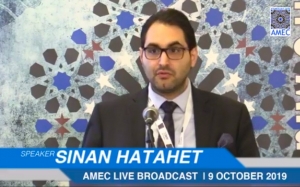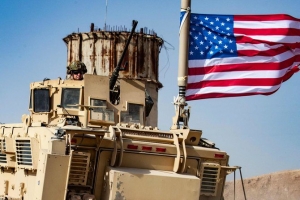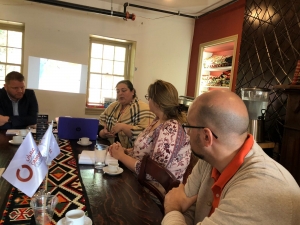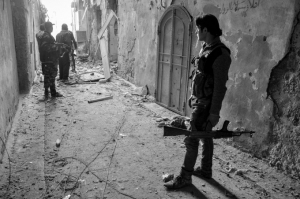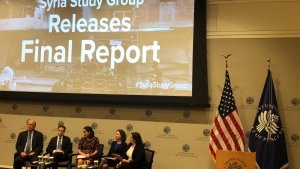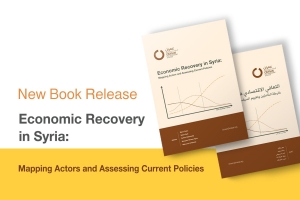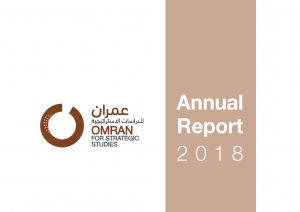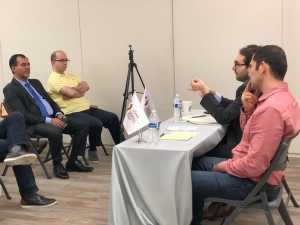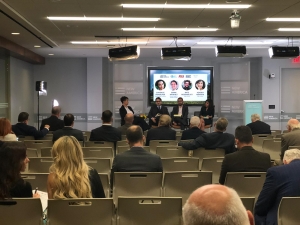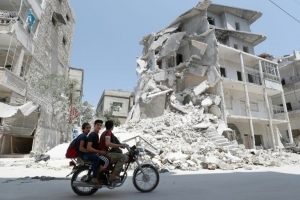Omran Center
Conference: Playground for foreign powers: MENA region as a target to foreign intervention
In Pretoria 8-9 October 2019. Omran Center Senior Fellow Dr. Sinan Hatahet participated at the annual international conference organized by Afro-Middle East Centre entitled "Playground for foreign powers: MENA region as a target to foreign intervention".
Navvar Şaban | Scramble for Syria after US withdrawal
The Information Unit Manger at Omran Center for Strategic Studies talked to Arab News about Scramble for Syria after US withdrawal.
Navvar Şaban said: The Syrian regime is not capable of striking a deal without being backed by Russians, and that Moscow would not want to lose its relationship with Ankara, Confirming Russians always talk about the Adana agreement. We are now talking about a renewal and reactivation of the agreement with new specifications to allow Turkey to go deeper into Syrian territories.
The resource: http://bit.ly/2MJem69
Discussion session: about the developments in Syrian situation
On 28th September 2019, Syrian American Council and Syrian Forum USA organized an event for the Syrian community at Syriana Cafe & Gallery in Maryland state.
Omran Center for Studies board member Mr. Yaser Tabbara, and Omran’s Information Unit Manager Navvar Saban talked about the latest trends in regard of the Syrian situation both locally and internationally, the event ended by a Q&A session.
Developments in regard of the Syria
Omran Center for Strategic Studies board member Mr. Yasser Tabbara, and Omran’s information unit manager Navvar Saban attended a round table hosted by Middle East Institute (MEI) in their main office in Washington DC on the 24th of September 2019.They talked in details about the most important issues and developments in regard of the Syrian file, which included the following:
1- Iranian threat in Syria.
2- The North developments in Syria.
3- Reintegrate militias in the structure of the Regime army.
4- Current fragile security situation in the regime areas.
In the second part of the round table, both of Mr.Tabbara and Saban answered the audience questions about different topics related to the ground situations in Syria and how it might affect the ongoing political efforts.
Discussion Session: about the final report for the Syria Study Group (SSG).
In Washington, 26 Sep 2019. Omran Center Senior Fellow Yaser Tabbara and Information Unit Manager Navvar Saban attended the release of the final report for the Syria Study Group (SSG).
This session organized by United States Institute of Peace (USIP) to present and discuss the assessments and recommendations of the final report, which took several months to work through extensive consultations across a wide range of local experts, regional and international stakeholders.
Economic Recovery in Syria: Mapping Actors and Assessing Current Policies
Introduction
The conflict in Syria that has been dragging on since 2011 generated many challenges that began to take shape as the conflict is coming to an end. Some of the key challenges pertain to early economic recovery which has already started in the various areas of the country, with their different influences, needs, resources and potentials. Given the current situation in Syria—with the consolidation of zones of influence and the faltering political process -local, regional, and international policies have begun to adapt to this reality, with key stakeholders launching early economic recovery projects in the established zones of influence.
The political and military landscape in Syria remains precarious and questions of the capacity of different actors, reality of these regions and the political context pertaining to economic recovery in these areas must be addressed in order for stakeholders to successfully implement early recovery projects. Accordingly, the Omran Center for Strategic Studies has developed a research series to understand the dynamics, political compass, requirements, and challenges of these early recovery projects so for them to facilitate the establishment of stability on the ground.
Early recovery is critical because it is the phase that is supposed to transition the country from conflict to peace and stability and lay the foundation for the subsequent reconstruction process. This phase has political and social dimensions that are of equal importance to its economic dimension. The political dimension involves working to stop violence throughout the country, establishing new governance institutions, and reaching a political solut3. Autonomous Administrationion that generates stability. The social dimension includes relief work, accommodations and housing for refugees, and national reconciliation after the preparation of an appropriate security environment. The economic dimension includes the restoration of basic public utilities, relaunching of the economy moving, rebalancing the macroeconomic framework, and dismantling the components of the conflict economy in areas both outside of and under state control. The above political, social, and economic elements are significantly intertwined and success in any one area depends on success in the other two.
The research orientation of Omran Center assumes that the coming phase in Syria will take place in a military post-conflict setting and that a most likely scenario to play out will be one of two: The first scenario is the instilment of the zones of influence: a ‘useful Syria’ with Iranian and Russian influence, eastern Syria with Western-Arab influence, and northern Syria with Turkish influence. The second scenario is continued investment in the ceasefire by regional and international actors, with priority placed on declared or undeclared negotiations to reach a new form of authority in which the existing regime maintains the largest share, thanks both to the efforts of its allies and the regime’s success in retaining the mechanisms of control.
The overall objectives of the research orientation of Omran Center are to identify criteria for an effective early economic recovery that is conducive to stability and development and to create a policy framework for implementing those recovery efforts. This research also aims to define the requirements and conditions for early recovery as they relate to security, governance, and development and to reach a position regarding the regime’s ability to handle Syria’s post-conflict challenges and to implement recovery and reconstruction policies. In this context, Omran has produced five reports:
1. A political analysis paper on the political context of early recovery in Syria;
2. An analytical paper of early economic recovery in Syria: challenges and priorities;
3. A paper on the political economy of early recovery in Syria;
4. A study on Early Recovery in Syria: An Assessment of the Regime’s Role and Capability; and 5. A study on the Turkish approach to early economic recovery in Syria, Euphrates Shield area as a case study.
For More Click Here: http://bit.ly/2lHvGit
Note of Appreciation
Omran for Strategic Studies expresses its gratitude for support received from Konrad-Adenauer-Stiftung.
Annual Report 2018
The Future of the Conflict in Syria
In coordination with Omran Center For Strategic Studies, Syrian American Council, and Syrian Forum USA a discussion session was coordinated on 14 Sep 2019, in Washington DC in America entitled "The Future of the Conflict in Syria" and what will be the field and political developments? Senior fellow Dr. Sinan Hatahet at omran center participated and considered that the challenge in 2020 to the Syrian revolution is to try to stop the bleeding and redefine the negotiating path with the regime by finding new understanding and spaces with the United States and the European Union. This leads to the formation of a new opposition bloc that relies on its own sources
Special Operations Policy Forum
Dr. Sinan Hatahet, Senior Fellow at Omran Center for Strategic Studies, participated in a panel entitled: What Follows the Fall of ISIS’s “Caliphate”. This was part of the Special Operations Policy Forum in Washington, DC Organized by New America on Wednesday Sep 18, 2019. The purpose of the invitation-only forum is to convene senior U.S. government leaders, leading academics, and national security policy professionals on how to confront the unconventional threats facing Special Operations Forces and how the U.S. military and U.S. government should respond to these threats. The forum was organized by New America, the Center on the Future of War and McCain Institute of Arizona State University (ASU), the Global SOF Foundation, and the Strategic Studies Institute of the U.S. Army War College.
Nawar Oliver | Russian Truce in Idlib and Hama and the initial reaction
Nawar Oliver, Omran Center military expert and the Information Unit manager on 2nd of Aug 2019, gave his remarks to the AFP about Russian Truce in Idlib and Hama and the initial reaction of some Opposition factions.
Oliver added, “Russia will continue to bomb civilians locations and carry out massacres, and keep on supporting the Regime ground attack during this ceasefire , The Russian has a long bad history when it comes to ceasefires with the oppositions faction, such as in Eastern Ghouta, Northern Homs, and Daraa.
Source: https://yhoo.it/2Yrc3NW

